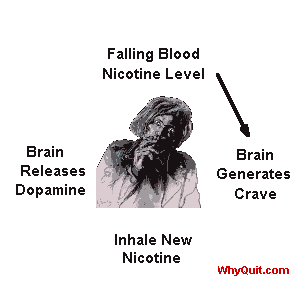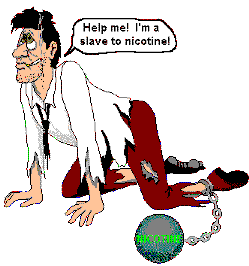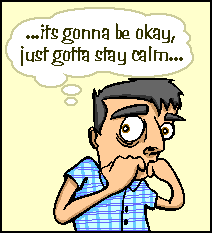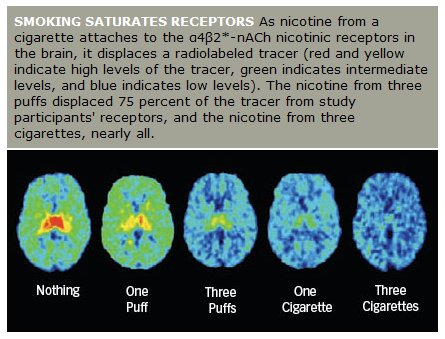
For smokers only: understanding and silencing the wanting within
Using truth to diminish anxieties and panic when attempting to quit smoking.

Is the world shouting "quit smoking" while your mind shouts "smoke another"? Do you feel trapped between wanting for that next cigarette and the harm it'll inflict? If so, don't feel alone. The wanting and conflicts are normal and real.
It's that time again. You sense wanting to smoke. You light up and inhale. Within 8 to 10 seconds nicotine arrives in your brain.
Just one puff is sufficient to activate up to half of your brain's dopamine pathway receptors. You feel an almost instant "aaah" relief sensation, as most wanting quickly subsides. A few more puffs and receptor activation and saturation is complete.
But it won't be long before wanting arrives again, as the nicotine remaining in your bloodstream will soon fall to an unacceptable level. It's a cycle that will be repeated again and again and again.
Nicotine addiction, like heroin, cocaine and other chemical addictions, is about the mind's dopamine pathway, our survival instincts teacher, being taken hostage. Our built-in priorities teacher, among other species survival events, this pathway
 is designed to generate wanting for food when hungry or wanting for water when thirsty. It also records in high definition memory how wanting was satisfied, making the solution to wanting nearly impossible, in the short term, to forget.
is designed to generate wanting for food when hungry or wanting for water when thirsty. It also records in high definition memory how wanting was satisfied, making the solution to wanting nearly impossible, in the short term, to forget.
Not understanding our chemical dependency, we were each forced to invent explanations as to why we needed to smoke again. As teenagers, common explanations included friendship or peer acceptance, rebellion, to look cool, to fit in, or to feel more adult. Over time we aged and our use rationalizations shifted. Now we claimed that we smoked mainly for taste, pleasure, stress control, like or love, concentration, weight control or boredom.
Our laundry list of use justifications was tailored to fully agree with and support the next time we'd sense dopamine pathway wanting for more smoked nicotine. Our rational, thinking mind had become a roadblock to quitting. Instead of figuring out how to arrest our dependency and help us escape, our use justifications were in total agreement and support of thousands of old nicotine replenishment memories, each screaming the lie that the way to make wanting end was to smoke more nicotine.
Your list of use rationalizations combine with your thousands of old use memories to make the prospect of breaking free frightening. Instead of seeing quitting as recovery, and wonderful, it's more like the thought of watching your best friend die. Recovery sabotaging fears generate self-induced anxieties capable of totally destroying nearly all quitting day confidence and resolve, before quitting day ever arrives (see Ferguson 2009) .
 And when able to muster the courage to bravely say "no" to wanting, self-induced fears and anxieties were always a moment of panic away from eating us alive from the inside.
And when able to muster the courage to bravely say "no" to wanting, self-induced fears and anxieties were always a moment of panic away from eating us alive from the inside.
But ask yourself, what would happen if nearly all of your use justifications were either untrue or irrational? What if you felt almost no sense of loss when quitting, few fears, little anxiety and no panic?
Taste, pleasure, stress relief, concentration, weight control, like or love, what if the real reason you smoked wasn't because you liked or loved it, but because you didn't like what happened when you didn't?
 Truth is, there are zero taste-buds inside human lungs, nicotine's path to the brain. Truth is, calling satisfaction of dopamine pathway wanting pleasure is like saying that it feels good to stop pounding your thumb with a hammer.
Truth is, there are zero taste-buds inside human lungs, nicotine's path to the brain. Truth is, calling satisfaction of dopamine pathway wanting pleasure is like saying that it feels good to stop pounding your thumb with a hammer.
Truth is, it's far more stressful being a smoker, not less. Nicotine is an alkaloid and both stress and alcohol turn urine more acidic. The more stressed we became or the more alcohol we drank, the more acidic our urine, the quicker nicotine was eliminated from our bloodstream, and the sooner our wanting again needed satisfying. Think about it, once we finished tanking-up with a new supply of nicotine the tire was still flat, or the bill still unpaid.
Concentration? Half of adult U.S. smokers lose 14 years of concentration as a result of death due to smoking related causes. Weight control? Are 6-8 temporary extra pounds worth 14.3 years of life? Imagine an illness that trades food for 81 known cancer causing chemicals, or that invites cessation weight gain by attempting to satisfy dopamine pathway wanting for nicotine by using extra food as a crutch to stimulate pathway overlap.
Bryan was 34 years-old when those 81 carcinogens ended his life, Noni was 33 and had just given birth to her first child, and Deborah was 39. Why didn't they quit while still time?
Why will 5 million smokers smoke themselves to death this year, roughly half during middle-age? The same reason that threatens your life: false fears and the anxieties they breed.
 An endless cycle of wanting flowing from our hostage brain dopamine pathway left us convinced that smoking nicotine was as important to survival as eating food or drinking water. Truth is, without food or water we die, while without nicotine we soon thrive.
An endless cycle of wanting flowing from our hostage brain dopamine pathway left us convinced that smoking nicotine was as important to survival as eating food or drinking water. Truth is, without food or water we die, while without nicotine we soon thrive.
But smoking becomes so tied to nearly every aspect of life that we became fearful that quitting will leave life meaningless, horrible or even miserable. Do you fear losing your ability to cope, your edge and your most dependable relationship of all? Unchallenged, the mountain of quitting anxieties generated by such irrational fears can make quitting seemingly impossible.
On the flip side, imagine education, truth and understanding leaving you almost totally convinced that there is absolutely nothing good about smoking. Absolutely nothing! Imagine fully embracing recovery instead of dreading and fighting it.
Ask yourself, why fear ending your senseless self-destruction? Does it make sense to fear a temporary journey of re-adjustment which transports us to entire days where we never once think about wanting to smoke nicotine? Why fear coming home to the mental quiet and calm that arrives once addiction's chatter ends?
 Why fear the 72 hours needed to rid the body of nicotine and move beyond peak withdrawal? Why fear ending arrival of the more than 500 gases and 3,500 chemical particles present in every puff? Why fear allowing yourself to heal?
Why fear the 72 hours needed to rid the body of nicotine and move beyond peak withdrawal? Why fear ending arrival of the more than 500 gases and 3,500 chemical particles present in every puff? Why fear allowing yourself to heal?
Why panic upon arrival of a less than three minute crave episode? Why dread the reward received once the crave episode passes? Why fear extinguishment of another nicotine use cue and the return of another slice of a nicotine-free life, a time, place, person, situation or emotion during which you had trained your mind to expect a new supply of nicotine?
You've likely tried quitting products but when have you tried destroying the fears and anxieties that make you think you need them? If knowledge is power, imagine what happens once you become more dependency recovery savvy than your addiction is strong.
And as for approved quitting products, while they clobber placebo inside clinical trials, they get clobbered just as badly by cold turkey in real-world use. You see, placebo isn't a real quitting method and clinical trials were not blind as claimed. Fact is, more long-term ex-smokers quit smoking cold turkey each year than by all other quitting methods combined.
Why pretend that you're not a "real" drug addict? Why pretend that your addiction is your friend? Why keep postponing getting serious about quitting and saving your life? Sadly, just more inventive rationalizations allowing the addict to keep their drug.
WhyQuit is the Internet's most popular cold turkey quitting site. It sells nothing, declines donations and is staffed entirely be volunteers. Loaded with articles, discussions, and videos exposing common use rationalizations, the  site's objective is simple: to aid cold turkey nicotine dependency recovery through motivation, education and support.
site's objective is simple: to aid cold turkey nicotine dependency recovery through motivation, education and support.
Imagine more than 100 free stop smoking video sessions with a smoking cessation educator who has devoted his entire working life, full-time, to helping smokers quit.
Millions of words at WhyQuit but they all boil down to one overarching principle. It's that one equals all, that lapse equals relapse, that one puff will always be too many, while thousands never enough. We call this principle the Law of Addiction. Yes, there's just one rule which if followed provides a 100 percent guarantee of success: no nicotine, just one challenge and day at a time ... to never take another puff!


